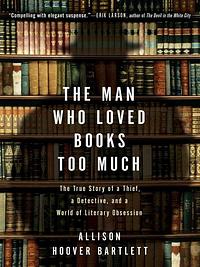Take a photo of a barcode or cover
Interesting story but ultimately I feel like the author failed to come to any conclusions. In particular, I'm bothered by the fact that she never did anything about the rare book that she had been 'borrowing'...for 3 years. Also her unwillingness to take any responsibility for knowledge she was gaining of past crimes. She specifically mentions talking to lawyers to make sure she didn't have any legal obligations to report any confessions, but goes on to say that legal and moral obligations aren't the same. We never get an answer from her on that. It's like she realized a little too late that what she was doing was wrong, and then didn't want to back out. More importantly she never comes to any conclusions about her subject either. She tells his story, sort of, but then finds she can't tie up any of the loose ends, so she just leaves it. The book feels unresolved.
So, if I did read this previously, I have no memory of it. I enjoyed the book; the story of John Gilkey and his counterpart in the story, Ken Sanders, is fascinating, as are the author's forays into the stories of other book thieves. However, I find myself incredibly disappointed in the author for two reasons. First, she does exactly what one of Mr. Gilkey's victims feared she would do; she presents him in an almost noble, sad sack appearance, stating that his reasons are understandable, as if that lessens his crimes. Secondly, when faced with what was surely a significant part of his collection of stolen books, she chooses to look away, to not see any titles, authors, or other distinguishing marks that could have put Mr. Gilkey in prison for a very long time. In doing nothing, she denies the victims the return of their stolen property, and makes herself a very witting accomplice to his activities.
If you are interested in learning more about the world of rare book sellers, this may give you some insight. It wasn't really my style, it was more of the author's experience of various events and interactions with the thief and how they related to her own upbringing than a reporting of events, but there likely wouldn't have been enough material for a full-length book otherwise, and perhaps others will really enjoy that style. A lot of male privilege revealed between these pages -- prepare for eye-rolling.
informative
lighthearted
fast-paced
I love these types of real life, crime stories where the crimes aren't physically violent. Bartlett presents the two sides of rare book crime - the rare book store owner/association security expert and the prolific thief. The author also has a personal stake in the story as she has somehow inherited a book from a friend that may or may not be stolen itself. While she interviews a few store owners, she only includes one thief but he is so awkwardly transparent, she really doesn't need anyone else to share. As a bibliophile myself, I found this entire situation fascinating and I want to read more about book crimes!
3.5 stars? I think??
This is kind of an odd little book. We have it - bafflingly - in the fiction section at work, mostly because it's the kind of thing the students would be interested in (because they LOVE true crime, bizarrely), but if we put it in the 300s, they'd never ever find it.
Essentially, it's the story of a guy who "buys" rare books using stolen credit cards, which the booksellers then lose out on when the card is reported stolen. The author is a journalist who spent months talking to this guy and with various rare book dealers.
Really, it's a book about loving books a hell of a lot, and the lengths that you'll go to in order to have copies of your favourites. So it was definitely interesting. But at the same time, it was kind of perplexing because it felt a liiiiiiitttle bit like she was romanticising him and what he's trying to do in stealing these books, and she's really only uncomfortable around him when he takes her to a rare book shop and talks her through how he selects things to steal when the vendor is sitting RIGHT THERE.
So it was definitely interesting. But at the same time, it read more like a very long investigative journalism piece than a book, if that makes sense...
This is kind of an odd little book. We have it - bafflingly - in the fiction section at work, mostly because it's the kind of thing the students would be interested in (because they LOVE true crime, bizarrely), but if we put it in the 300s, they'd never ever find it.
Essentially, it's the story of a guy who "buys" rare books using stolen credit cards, which the booksellers then lose out on when the card is reported stolen. The author is a journalist who spent months talking to this guy and with various rare book dealers.
Really, it's a book about loving books a hell of a lot, and the lengths that you'll go to in order to have copies of your favourites. So it was definitely interesting. But at the same time, it was kind of perplexing because it felt a liiiiiiitttle bit like she was romanticising him and what he's trying to do in stealing these books, and she's really only uncomfortable around him when he takes her to a rare book shop and talks her through how he selects things to steal when the vendor is sitting RIGHT THERE.
So it was definitely interesting. But at the same time, it read more like a very long investigative journalism piece than a book, if that makes sense...
An interesting tale of the multiple sides of the book collection world...and into the minds of the people who live there.
I'm a sucker for a true story about book lovers. So interesting how teh author got drawn into the action and the story itself. The action and interest seemed to dwindle in the last quarter of the book though.






